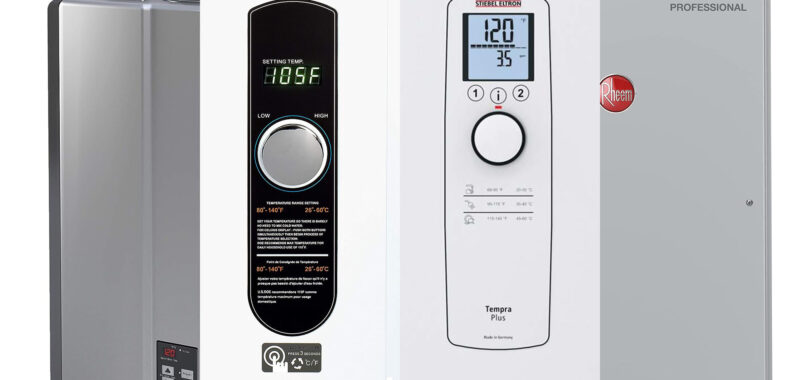We may earn revenue from the products available on this page and participate in affiliate programs. Learn more ›
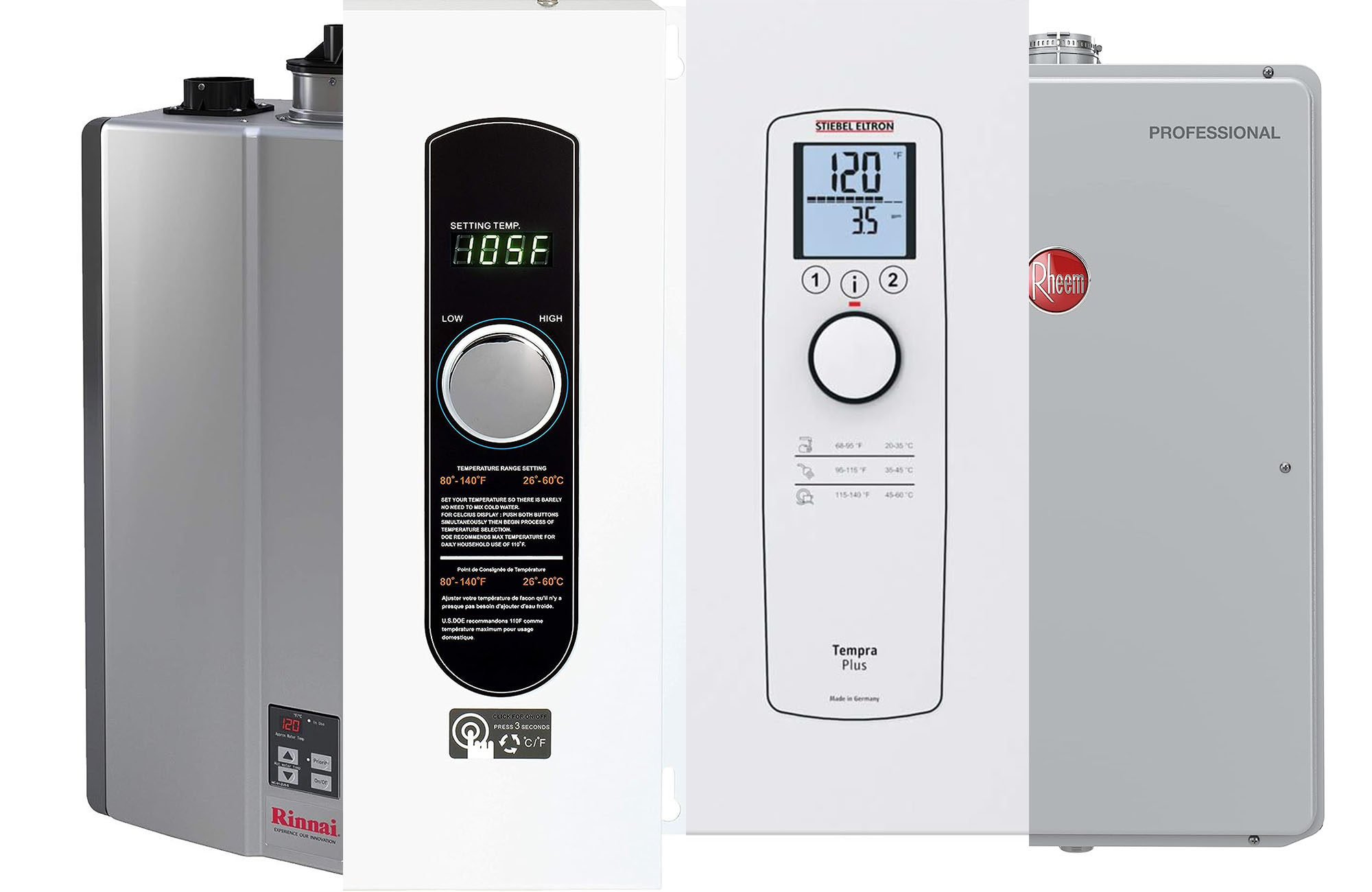
Few upgrades have the same kind of tangible effect on your home’s experience as a tankless water heater. These appliances provide a constant stream of hot water without relying on a bulky, problem-prone tank. That typically translates into less maintenance, fewer floods, and no more running out of hot water mid-shower. We’ve chosen the Rinnai RU199iN Tankless Water Heater as our best overall pick for its versatility, efficiency, and sparkling reputation with pro installers. Keep reading for the rest of our picks to match just about any space or budget.
How we chose the best tankless water heaters
Selecting the best tankless water heaters required extensive research into a variety of products before paring down the list to these top tankless water heaters. It was necessary to scrutinize each potential option by considering the key factors important for a tankless water heater, including the fuel type, size, flow rate, and the number of fixtures each product can supply simultaneously.
Gas tankless water heaters offer the most power but tend to be the most expensive to purchase and install. However, electric water heaters will typically cost more in energy bills, so there is some tradeoff over time. With this in mind, the list includes natural gas, propane, and electric models to offer a variety of top options. Flow rate, when compared to temperature rise, was another key consideration.
While many manufacturers state the maximum flow rate, this specification is really only useful in areas with the highest groundwater temperature. Instead, it was necessary to note the maximum and minimum flow rates based on the potential groundwater temperatures to compare products accurately. Only after researching and comparing these product specifications was it possible to create this list of the best tankless water heaters.
The best tankless water heaters: Reviews & Recommendations
This list was compiled after extensive research into the fuel type, flow rate, size, and the number of fixtures to which each tankless water heater can supply hot water simultaneously. Look at this list of the best tankless water heaters to find an appliance suitable for the home.
Best overall: Rinnai RU199iN Tankless Water Heater
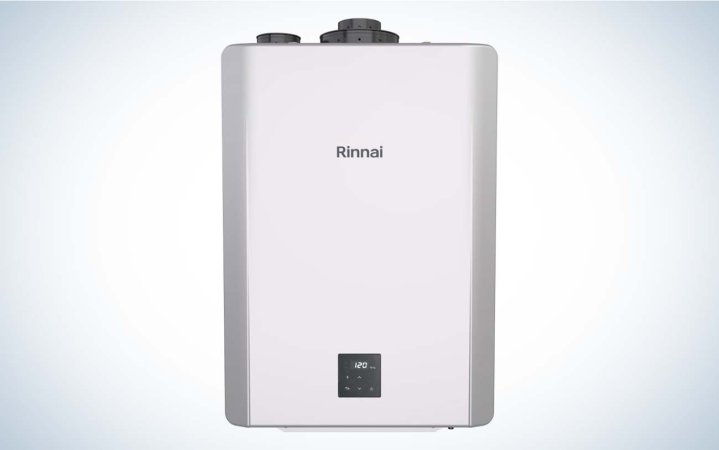
Rinnai
See It
Pros
- Can be paired with a WiFi module or an external pump for enhanced operation
- High maximum output of 11 gallons per minute
- Capable of supplying up to seven fixtures simultaneously
- Durable design can last for 20 years
Cons
- WiFi module and the external pump for recirculation are sold separately
Why it made the cut: The powerful 11 GPM flow rate is more than enough for most four- to six-person families.
Specs
- Fuel Type: Natural gas
- Max flow rate: 11 GPM
- Min flow rate: 7 GPM
- Dimensions: 14.76”Dx22.05”Wx33.86”H
- Number of fixtures: 2 to 7
- Price: $1,384
Natural gas tankless water heaters are generally considered the best option for medium- to large-size families because these appliances typically have a higher heat output, allowing them to heat more water at a faster rate. For instance, this tankless water heater by Rinnai can heat 11 gallons of water per minute, making it an ideal option for big families or areas with low groundwater temperatures, like Montanna or Minnesota.
The tankless water is compatible with Rinnai’s WiFi module, making it easier for users to closely monitor the temperature, power output, and energy consumption. This product can also connect to an external pump to reduce the wait time for hot water through scheduled or on-demand recirculation. However, it’s necessary to note that both the WiFi module and the external pump are sold separately, so these features are only available with an additional purchase.
Even without the WiFi module or external pump, this tankless water heater can simultaneously supply hot water to up to seven fixtures, ensuring everyone gets ready on time during the morning rush to school and work. Additionally, this tankless heater by Rinnai can last up to 20 years with proper inspection and maintenance before the homeowner needs to consider replacing or upgrading the appliance.
Best value: Ecosmart ECO 24 Tankless Water Heater
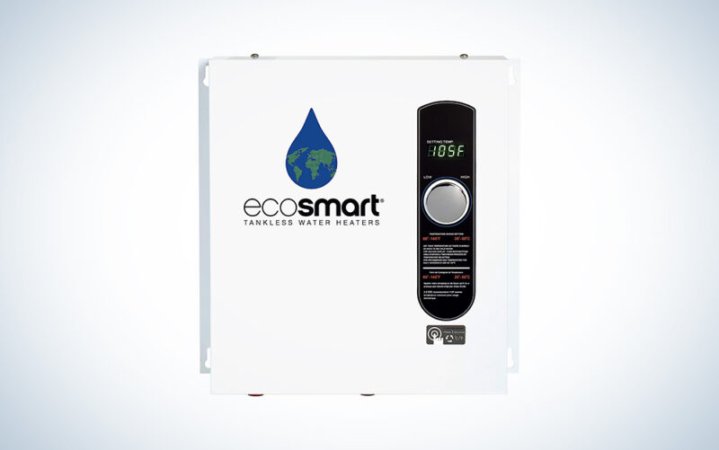
See It
Pros
- Compact size doesn’t take up a lot of space
- Affordable purchase price
- Ideal for small homes with one or two people
- Flow sensor modulates energy consumption to meet hot water demands
Cons
- Requires three 40-amp double pole breakers
- Only supplies one to two fixtures simultaneously
Why it made the cut: Homeowners on a budget can still upgrade from an old tank-style water heater with this affordable appliance by Ecosmart.
Specs
- Fuel Type: Electric
- Max flow rate: 5 GPM
- Min flow rate: 2 GPM
- Dimensions: 3.75”Dx17”Wx17”H
- Number of fixtures: 1 to 2
- Price: $528
One of the first decisions to make when deciding on a new tankless water heater is whether it would be best to have a gas, propane, or electric model. This electric tankless water heater by Ecosmart is a great option for homeowners who want to switch from an old tank-style water heater but may not have a large enough budget to afford a gas tankless water heater.
Beyond the affordable price, this tankless water heater has a built-in flow sensor that will automatically modulate the energy consumption to ensure the water doesn’t get cold in the middle of a shower.
It’s a good choice for individuals who live independently or in homes with two people, though it does not have a high enough flow rate for medium- to large-size families. Also, the electric tankless water heater requires three 40-amp double pole breakers for installation, so it’s recommended to consult with an electrician to ensure the home is equipped for this appliance.
Best electric: Stiebel Eltron Tankless Water Heater
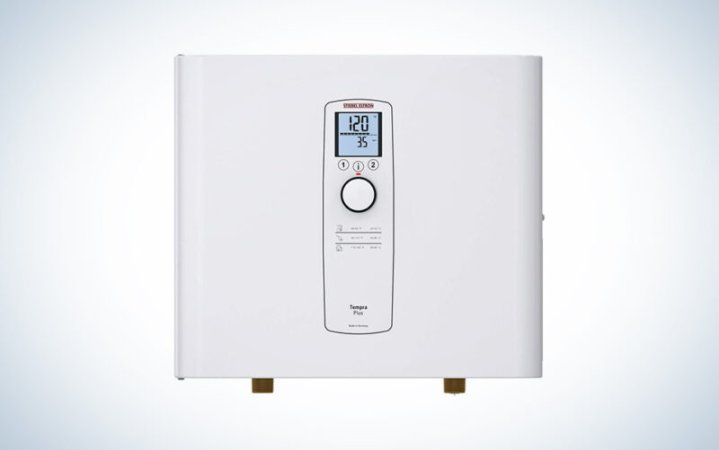
See It
Pros
- Advanced Flow Control optimizes output for ideal heating
- Self-modulation technology ensures the least amount of energy is used for operation
- Easy-to-read digital control panel
- Near-silent operation
Cons
- Not intended for homes with four or more people
Why it made the cut: Equipped with flow control and self-modulation technology, this tankless water heater offers superior user convenience and high energy efficiency.
Specs
- Fuel Type: Electric
- Max flow rate: 7 GPM
- Min flow rate: 3.8 GPM
- Dimensions: 4.63”Dx16.63”Wx14.5”H
- Number of fixtures: 1 to 3
- Price: $675
Electric tankless water heaters, like this high-efficiency model by Stiebel Eltron, operate at a near-silent noise level, so they can be installed close to a common area without disrupting social gatherings. This tankless water heater comes equipped with Stiebel Eltron’s Advanced Flow Control technology, allowing it to automatically reduce the water pressure if it detects that the demand is greater than it can handle. This allows the water heater to ensure the water temperature remains the same despite the high demand.
The tankless water heater also features a simple, easy-to-use digital control panel and built-in self-modulation technology. The self-modulation feature allows the tankless water heater to control the energy output so that the tankless water heater operates as efficiently as possible. Just remember that this unit is unsuitable for larger families due to the low max flow rate.
Best gas: Rheem Prestige Tankless Water Heater
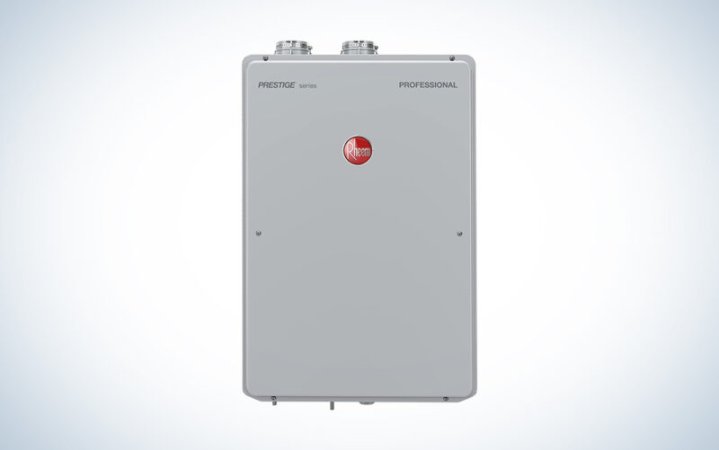
See It
Pros
- Space-saving design
- Suitable for small- to medium-size families
- Built-in water and gas leak detection system
- Digital remote thermostat for easy operation
Cons
- Requires venting to the outside of the home
Why it made the cut: This tankless water heater is designed with a built-in water and gas leak detection system to help protect the home in the case of an emergency.
Specs
- Fuel Type: Natural gas
- Max flow rate: 8.4 GPM
- Min flow rate: 3 GPM
- Dimensions: 9.8”Dx18.5”Wx27.5”H
- Number of fixtures: 2 to 5
- Price: $1,366
Investing in a gas tankless water heater is a good idea that can help save on energy bills and cut down on wasteful spending. Instead of relying on a tank-style water heater that will continuously heat the contents of the tank, regardless of whether the water is in use, homeowners can switch to this tankless model, which heats up to 8.4 GPM of water on demand.
This Rheem Prestige tankless water heater runs on natural gas, so during the initial installation, the plumber will need to run venting to the outside to ensure that the exhaust does not build up inside the home. After installing the unit, the built-in water and gas leak detection system will monitor the tankless water heater and shut down the unit if it detects a leak. Additionally, the system will display an error code to indicate the problem so the homeowner can take the necessary steps to resolve the issue.
Best propane: Rinnai V53DeP Tankless Water Heater
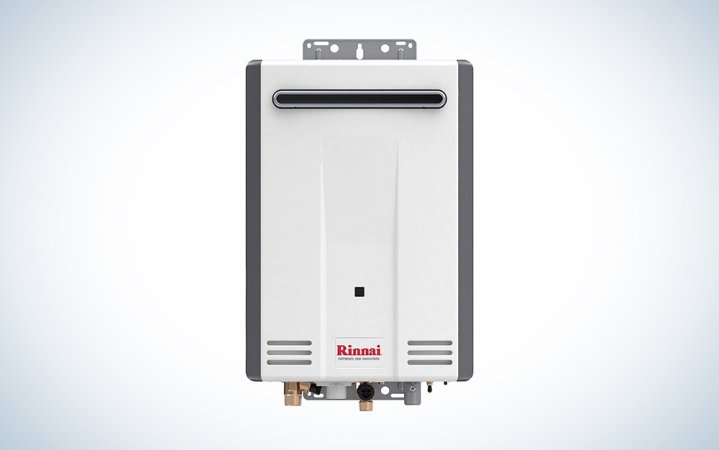
See It
Pros
- Designed for installation outdoors
- Durable construction can last for up to 20 years
- Enhanced scale detection feature reduces the risk of internal damage
- Outdoor installation does not require venting
Cons
- Only supplies one to two fixtures simultaneously
Why it made the cut: Install this propane tankless water heater outside for the pool, spa, or even an outdoor kitchen.
Specs
- Fuel Type: Propane
- Max flow rate: 5.6 GPM
- Min flow rate: 3 GPM
- Dimensions: 7.9”Dx14”Wx19.8”H
- Number of fixtures: 1 to 2
- Price: $602
When most people invest in a tankless water heater, they tend to go with either a natural gas or an electric model, but there are also propane tankless water heaters, like this product from Rinnai. The tankless water heater can connect to a ¾-inch propane line for fuel and is designed for outdoor installation, making it a great option to get hot water to the pool, spa, or outdoor kitchen.
This tankless water heater has a durable body and internal components that can last 20 years with proper maintenance. Rinnai has included an enhanced scale detection system to protect further the unit that indicates when limescale begins to build inside the appliance. This notification allows users to contact a plumber to flush the system and keep it functioning for years to come. However, it’s important to note that the tankless water heater can only supply one to two fixtures simultaneously, so it’s not the best option for larger households.
What to consider when buying the best tankless water heaters
Before purchasing a new tankless water heater for the home, it’s recommended to familiarize yourself with some of the more important product factors, including the type of fuel, the size, and the flow rate. It’s also a good idea to learn how temperature rise can affect the unit’s performance.
Fuel type
There are three types of tankless water heaters, differentiated from each other based on the fuel or energy source:
- Electric tankless water heaters are generally the least expensive option to purchase and install, though electricity costs are higher than natural gas or propane. This type of tankless water heater is typically used for homes with small- to medium-sized families that don’t require a high flow rate.
- Natural gas tankless water heaters are the most common option for medium- to large-size families because they tend to have a higher flow rate, allowing these appliances to supply several fixtures with hot water simultaneously. However, natural gas tankless water heaters cost more upfront and typically require venting, which increases the installation cost.
- Propane tankless water heaters are less common than electric or natural gas units, but these appliances can be effective for small homes or point-of-use installations. The drawback with propane units is that the homeowner or user needs to purchase or refill propane tanks for operation regularly. But, hey, if you’ve got one of the best propane grills, this isn’t a new phenomenon for you.
Size
One of the main benefits of having a tankless water heater is that they are significantly smaller than traditional tank-style water heaters. However, it’s still important to consider each unit’s depth, width, and height to ensure that the tankless water heater will fit in the planned space. Electric tankless water heaters tend to take up less room than natural gas or propane products, so they are generally the best choice for smaller homes without a lot of free space.
However, it’s worth noting that some tankless water heaters can be installed outside, so it may be more beneficial to opt for an outdoor installation if there isn’t a lot of space inside. Just make sure that the tankless water heater isn’t too bulky or too heavy to mount in the designated location, and leave space for water lines, electrical connections, and gas vents.
Flow rate
The flow rate of the tankless water heater refers to the amount of water the appliance can heat within a specific amount of time. Generally, the flow rate is measured in gallons per minute (GPM). Powerful gas tankless water heaters can often produce over 10 gallons of hot water each minute of operation, though this may not be required for smaller homes.
To determine the most suitable flow rate for the household, you will need to consider the various fixtures and appliances that may require hot water. Faucets typically require about 0.5 GPM, dishwashers require 1 GPM, washing machines need 1.5 GPM, and showers need 2 to 2.5 GPM. If you want to run the washing machine while in the shower, the tankless water heater will need a flow rate of at least 4 GPM.
Temperature rise
An aspect often overlooked when researching tankless water heaters is that the flow rate depends on the local groundwater’s temperature. The colder the groundwater, the more energy the tankless water heater requires to heat the water to the desired temperature. Temperature rise is the term used to indicate the difference between local groundwater temperatures and the desired hot water temperature.
Large temperature rises, such as 40 degrees to 120 degrees Fahrenheit, will require more time and energy than a smaller temperature rise of 70 degrees to 120 degrees Fahrenheit. Due to the higher energy cost, tankless water heaters will have a lower flow rate in areas with low groundwater temperatures. Before purchasing a tankless water heater, check the average groundwater temperature in the area to ensure you purchase a model with a high enough flow rate to overcome the temperature rise.
FAQs
To ensure that there is enough hot water for multiple fixtures to operate normally at the same time, it’s recommended for a family of four to have a tankless water heater with a flow rate that falls between six to eight gallons per minute.
As long as the demand for hot water does not exceed the maximum flow rate of the tankless water heater, you can hypothetically run it for an indefinite period. Just keep in mind that the more fixtures simultaneously using water, the less effective the tankless water heater will be.
When a tankless water heater is properly inspected and maintained throughout its life, it can last for up to 20 years, while a standard tank-style water heater will typically only last between eight to 12 years.
Final thoughts on the best tankless water heaters
Replacing an old tank-style water heater with a new tankless model is one of the most straightforward ways to cut down on energy costs because the tankless water heater will only operate when there is a need for hot water. When the water is not in use, the unit only uses enough electricity to remain on, reducing the energy consumption for the household.
However, it’s important to consider the number of people in the home, as well as the geographic location, to find a tankless water heater with a high enough flow rate to ensure that there will always be hot water on demand. With this in mind, carefully consider product specifications and use this information to find the best tankless water heater for your home.

